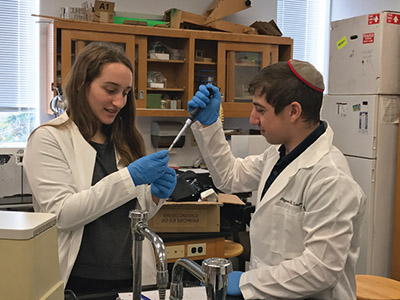

The STEM program at the Rae Kushner Yeshiva High School is a four-year sequence of courses spanning all high school grades, including coding (ninth grade), AP computer science (tenth grade), scientific engineering (tenth grade), robotics engineering (eleventh /twelfth grade), genetic engineering (eleventh grade), biomedical engineering (twelfth grade), DNA chug (all grades) and an independent scientific research track (tenth through twelfth grades). The RKYHS STEM approach has students “learning science by doing science” and focuses on problem-solving and critical thinking, encouraging innovation and invention, while teaching substantive science, mathematics and a variety of gateway skills, including electronics, circuitry, programming, genetics, mechanics and data analysis.
Eleventh graders currently in the genetic engineering class are focusing on three main areas: the fundamentals of molecular genetics, recombinant DNA research and BioInformatics; the study and exploration of the scientific literature related to a specific human genetic disease, and the production of a comprehensive research proposal addressing a particular issue associated with the disease; and a hands-on, in-depth participation in a comprehensive scientific research program in partnership with the Waksman Institute at Rutgers University.
This week, RKYHS genetic engineering students isolated their first set of plasmid DNA from Landoltia punctata, a duckweed species important for biofuel and bioremediation, as part of RKYHS’ collaboration with the Waksman Institute and Rutgers University. Students were assisted by senior Beryl Artman, the teaching assistant for the genetic engineering class and Waksman student scholar who recently published four novel DNA sequences of Landoltia punctata that are now part of the GenBank database of DNA sequences at the National Center for Biotechnology Information (NCBI), which is the international repository for DNA sequences.
Artman’s publications relate to his findings this summer at the Waksman Student Scholar Program (WSSP), where he spent more than 100 hours learning advanced molecular biology and BioInformatic techniques. The genes Artman identified come from Landoltia punctata.
As part of his independent scientific research program at RKYHS, Artman developed a novel, arduino-based thermocyler—a DNA copy machine—that facilitates polymerase chain reaction (PCR) based DNA amplification. A thermocycler is a necessary piece of lab equipment to perform advanced molecular biology and genetic engineering research and can cost upwards of $10,000. Artman’s device, while having a superior user interface and improved functionality, costs less than $200 to build. He performed all of the coding, circuitry and component design and is now getting ready to perform side-by-side analysis with the commercial device.













